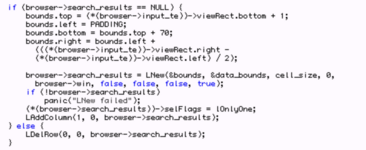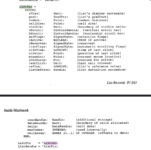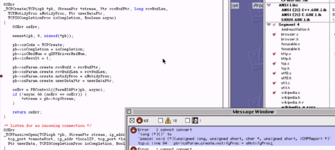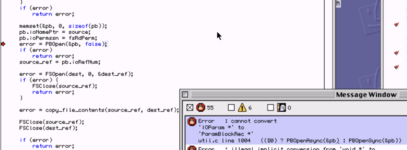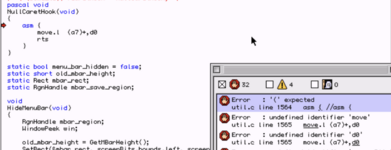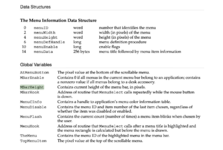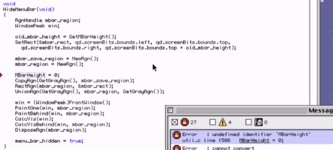MarcTremblay
Active member
AH, now that worked! I guess you have to explicitly write (struct browser*) because if you don't, then it's going to cast to a pointer instead of a struct.
OK, next are a bunch of undefined identifier screenBits. SHHH! Don't tell me this one, because I know already. You told me before...

That's right. I learn fast ;-) qd.screenBits !
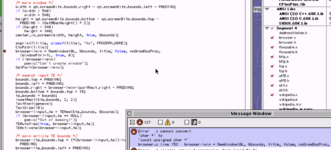
OK, for that one, I'm not sure what it wants. It's defined like this: char title[256];
I guess I could just do this?
browser->win = NewWindow(0L, &bounds, (unsigned char*) title, false, noGrowDocProc, (WindowPtr)-1L, true, 0);
...yep, it seems to work.
Then, there's this, but don't tell me! I just did this one 10 minutes ago so I know what it is

I'm going to do: focusable = (struct focusable*) xmalloczero(sizeof(struct focusable));
...yep, it worked.
So after those 10 errors fixed, we're down from 127... to 127 lol... I think 127 is the max amount of errors that can be stacked in CW9. Maybe I'm at like 573 errors right now and I don't know yet XD
OK, next are a bunch of undefined identifier screenBits. SHHH! Don't tell me this one, because I know already. You told me before...

That's right. I learn fast ;-) qd.screenBits !

OK, for that one, I'm not sure what it wants. It's defined like this: char title[256];
I guess I could just do this?
browser->win = NewWindow(0L, &bounds, (unsigned char*) title, false, noGrowDocProc, (WindowPtr)-1L, true, 0);
...yep, it seems to work.
Then, there's this, but don't tell me! I just did this one 10 minutes ago so I know what it is

I'm going to do: focusable = (struct focusable*) xmalloczero(sizeof(struct focusable));
...yep, it worked.
So after those 10 errors fixed, we're down from 127... to 127 lol... I think 127 is the max amount of errors that can be stacked in CW9. Maybe I'm at like 573 errors right now and I don't know yet XD
Last edited:

